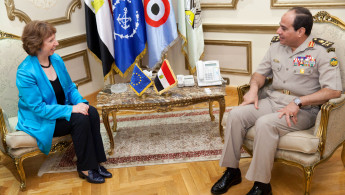Europe's neighbour Egypt gets soft rebuke from Brussels
In the European Commission's most recent European Neighbourhood Country Report, Egypt is described as a "key foreign policy partner".
Although Europe's influence with Egypt has diminished significantly since the Suez crisis in 1956, the EU does endorse Egypt in their European Neighbourhood Policy and issues a report on the country.
Europe's neighbour
The report, which was largely unreported by the press, reviews the country's record on human rights and personal freedoms, and makes recommendations of how the government can improve the situation.
The sparse coverage of the report would indicate a neglect of Egypt's plight, not only by the EU but also by European media.
Since the military coup in July 2013, and the swearing into office of Abdel Fattah al-Sisi in 2014 following highly controversial elections, Egypt has remained without a parliament.
The EU's report states that the parliamentary elections are "due to take place in March and April 2015" as planned in its "transitional roadmap". But it has since been announced that elections have been postponed.
Hend, an Egyptian journalist, who did not want her full name published, says "no one knows when they will happen".
Basma, another Egyptian journalist, who also asked for anonymity, believes that the parliamentary elections will be held by the beginning of 2016 at the latest. She does not know, however, how the parliament will be constituted in the end.
The recommendation made by the commission regarding the elections is to complete the transitional roadmap and ensuring democratic elections.
"Egypt made limited progress… especially on deep and sustainable democracy," the report stated.
Death penalty
The report comes exactly one year after 529 members of the Muslim Brotherhood were handed collective death sentences for the killing of a police officer and other offences.
The trial that led to the conviction was highly controversial and only took two days with most of the accused tried in absentia.
The report went on to criticise the "continued use of death sentences", which has been handed down to 1,200 people in March and April 2014.
It also went on to condemn the "restrictions on civil society and peaceful demonstrations" and the targeting of Muslim Brotherhood members, journalists and activists by the Egyptian authorities.
The most prominent of these cases was the trial of three al-Jazeera journalists, as well as the jailing of the activist Alaa Abd El Fattah. The targeting of the government's opponents continues to this day.
Two months before the report was published, the European parliament adopted a resolution on the situation in Egypt.
| The Egyptian foreign ministry said that the resolution was unsupportive of EU-Egyptian relations. |
This expressed the body's "grave concern at the ongoing restrictions of fundamental rights", and called for the "immediate and unconditional" release of all prisoners of conscience, and alleged Muslim Brotherhood members.
The Egyptian foreign ministry responded by saying that that the resolution was unsupportive of EU-Egyptian relations and contained incorrect information.
"These political prisoners are charged with criminal offences, so as to make it look like that there are no political prisoners in Egypt," Basma said.
Counter-criticism
Statements like this have led Egyptian TV stations to allege that the European parliament is supporting the Muslim Brotherhood.
One of the major policy concerns for the EU about Egypt, however, is the growing influence of the Islamic State group (IS, formerly known as ISIS) controlled groups in the region.
Cooperation with Egypt in the fight against terrorism has in fact been stepped up through a seminar organised by the EU's counter-terrorism coordinator on foreign fighters in Syria.
There are plans for further cooperation in this field that will focus on the phenomenon of foreign fighters, de-radicalisation programmes and counter-narratives.
Some EU states have cooperated with Cairo in a more direct way. France earlier this year sold 24 Rafale fighter jets to Egypt.
Egypt has also become a major staging post for "irregular migration" with the EU noting a marked increase in the number of people being smuggled by boat to Europe from North Africa.
The Guardian reported earlier this month that the EU already has set up plans to outsource its patrols of the Mediterranean, and asylum applications will be done in North African countries such as Egypt and Tunisia so as to reinforce fortress Europe.
Despite some nuanced wording of the report, there are several concrete criticisms of the current human rights situation in Egypt.
The EU described freedom of assembly in Egypt as being seriously restricted by the controversial 'protest law' and that the freedom of the press has been reduced significantly since the military took over the government.
"The military consolidated its influence over key political decisions in Egypt", it went on to say.
However, if the European Union is taking steps to pressure the Egyptian government to back away from the use of repressive measures against its opponents, then this doesn't appear immediately apparent.
"Maybe there are, but I am not feeling them," says Hend.



